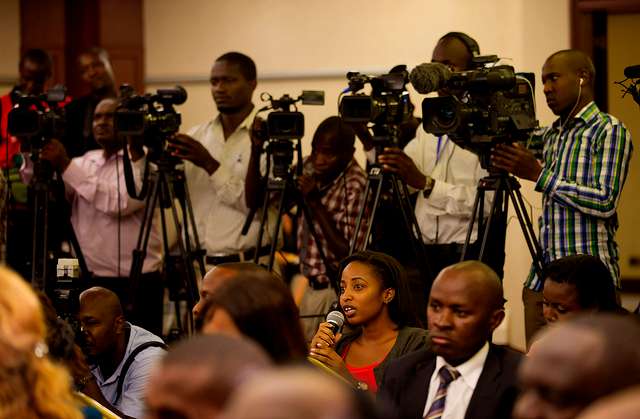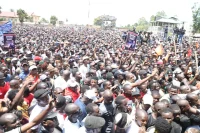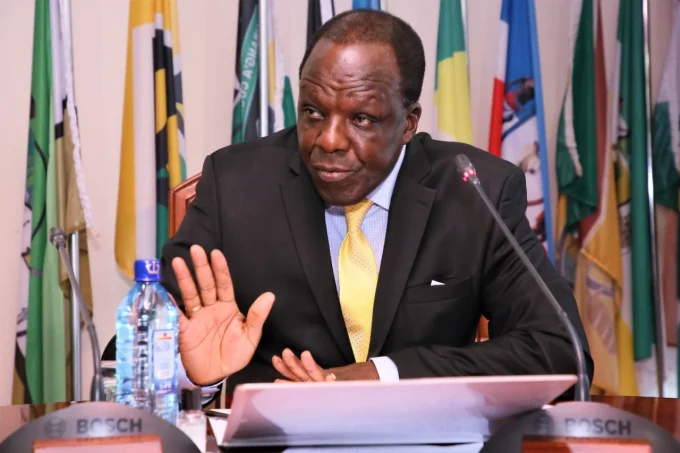[dropcap]A[/dropcap]s the clock to ticks to 30th January, 2018, the D-day for NASA leader Raila Odinga’s swearing-in as the People’s President of Kenya, the government has swung into action to frustrate the plan – or at least reduce its impact.
While it has already cordoned off Uhuru Park, the planned venue, which sets the stage for confrontation with police, State House has also moved to block live coverage of the event, if at all it takes place.
President Uhuru last week summoned managers of all the main TV stations in Kenya for a meeting at State House where, BUSINESS TODAY has been told, he warned them against live coverage of the Raila swearing.
RELATED: How Uhuru lectured media owners at State House
A State House insider who talked to BT says the president was very categorical about this and did not mince his words: any TV station that covers the event live risked its broadcast licence being revoked.
“Yes, he met the media managers in a brief meeting before he left for Addis Ababa last week,” said the State House official, who requested not to be identified. “He was very clear about the consequences of going against this directive.”
After the meeting, President Uhuru flew out to Ethiopia for the 30th Ordinary Session of the African Union Assembly, but he is expected back tonight, with the swearing of Raila Odinga creating political tension in the country.
READ: Raila acquires presidential flag and golden sword
SEE: NTV presenter Larry Madowo clashes with NMG CEO
Barring live coverage is aimed at killing the euphoria of the activity which would certainly lead into celebrations in NASA strongholds in Western Kenya, Nyanza, Kisii, Ukambani, Nairobi and most parts of Coast region and Turkana. This would give Raila some sort of legitimacy in the eyes of the public. At times the government uses Kenya Power to switch off electricity in select areas.
Meanwhile, the Cabinet Secretary for ICT, Mr Joe Mucheru, has been calling media owners and editors to reiterate the president’s directive. Media houses have found themselves, once again, in a very familiar situation, where the government arm-twists them into doing its bidding. In the 2013 elections, all TV stations were barred from covering press conferences live in what was disguised as effort to maintain peace.
In the last elections, media houses were barred from running independent tallying of presidential elections results.
Will media houses yield? The options are very limited for them. It’s the either or situation – and either way they will be damned! The public is watching and is likely to lose confidence in media houses as this directive tests the cardinal principle of independence in journalism.
This also raises questions on the continued, and all the more worrying, control the Uhuru administration is gaining on media houses. Both the president and his deputy William Ruto are said to have been influencing the composition of editorial management in the two main media houses – Nation Media Group and Standard Group.
SEE ALSO: Royal Media journalist joins Uhuru cabinet
Exits of high-profile journalists during their first term of office have been linked to State House machinations. Those who have been pushed out include popular editorial cartoonist Godfrey Mwampembwa, alias Gado, who was kicked out of Nation and later rehabilitated by Standard newspaper, where he has been forced to tone down. Others who are believed to have been axed courtesy of State House advice include former Saturday Standard Managing Editor Denis Galava, Sunday Nation news editor Mugumo Munene and investigative editor Andrew Teyie.
Recently, Deputy President communications director David Mugonyi was on the spotlight for threatening Sunday Nation reporter Justus Wanga with sacking for writing a critical story about his boss.













I cant believe a journalist in the modern world can say this and believe in it? How can you be so insolent about the power of social media. You should know that nowadays, people actually read stories on waatsaap, twitter and facebook before they see them on TV or print media. And how many Kenyans and the world have TVs compared to those who have mobile phones?